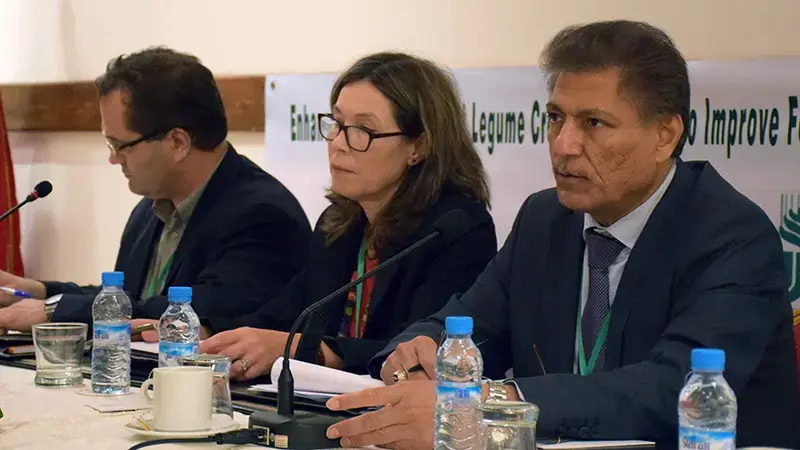EU-IFAD initiatives to ensure food security amidst climate change

Speaking at an event of the UN Climate Change Conference/COP21 in Paris, Dr. Kanayo F. Nwanze, President of International Fund for Agricultural Development (IFAD) described the challenges faced by agriculture and identified methods to build the resilience of food systems. This event, Lima Paris Action Agenda Agriculture Day, mobilized a wide range of government stakeholders and international organizations in four keys areas: soils in agriculture, the livestock sector, food losses and waste, and sustainable production methods and resilience of farmers. A Joint EU/IFAD/CGIAR report on climate research and smallholders was shared which highlighted innovations for smallholder agriculture to ensure food security amidst climate change and included examples from ICARDA’s collaborative research.
ICARDA has successfully partnered with EU-IFAD on several initiatives addressing climate change challenges in dry areas. One such project, “Enhanced Smallholder Wheat Legume Cropping Systems to Improve Food Security under a Changing Climate in the Drylands of West Asia and North Africa”, has contributed significantly to enhancing sustainable production systems in the region over the past three years. The project introduced improved wheat and legume varieties and better management practices that offer higher yield potential and a greater tolerance to abiotic and biotic stresses — with better prospects for increased productivity.
At the final technical committee meeting of this project in Rabat, Morocco, 10-11 October, 2015, Dr. Kamel Shideed, ICARDA’s Assistant Director General for International Cooperation and Communication, cautioned, “The demand for staple crop products will increase as much as 60% by the year 2050 — with the largest increase over the next 20 years due to population and income growth as well as the demand for biofuels.” These shortages in food production can be addressed by increased crop productivity, he added. Dr. Shideed also gave an update on the new CGIAR Research portfolio and a current assessment of food security in the Middle East and North Africa (MENA) region.
In 2015, more than 10,000 farmers across the eight project countries (Algeria, Egypt, Jordan, Lebanon, Morocco, Sudan, Tunisia and Turkey) were exposed to improved and affordable technologies both in wheat (durum and bread wheat) and food legumes (faba bean, chickpea and lentil) crops. Improved varieties, improved pest and disease management packages, supplemental irrigation and conservation agriculture (direct drill and raised bed planting) were the major technology components disseminated. Other implemented activities such as the initiation of quality seed production and efficient (community based or small scale enterprise) seed delivery system and increased capacity building with farmers field schools, field days and combined classroom and field training days impacted a great number of farmers and extension staff. Compared to 2014, an increase of 35% was accomplished in the number of farmers exposed to improved technologies. There was a 50% rise in capacity building activities. Most project advocated technologies were submitted with cost-benefit data to help farmers decide on their adoption and use for increased crop productivity and improved livelihoods.
These project results demonstrate the impact of bringing together scientific and local knowledge to address current and emerging climate change challenges faced by smallholder farmers in drylands.
